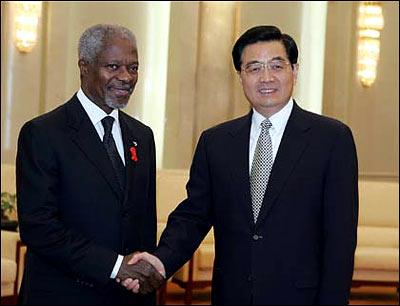As a permanent member of the United Nations Security Council,
China promotes multilateralism in safeguarding the authority of the
UN, advocates a just and rational world political order, opposes
unilateralism and hegemonism, and devotes itself to promoting
democratized and law-based international relations. China actively
takes part in UN cooperation in peacekeeping, arms control,
anti-terrorism, fostering development, defending human rights and
justice, and environmental protection, and the activities of UN
specialist agencies. China also attaches great importance to other
multilateral systems, promotes international arms control and
disarmament, supports the multilateral arms control process
including the development of non-proliferation mechanisms; it also
supports multilateral practical cooperation relating to
counter-terrorism, non-proliferation, humanitarian aid, climate and
environment, avian flu and transnational crime.
 |
In January 2005, Premier Wen Jiabao and then in April, President
Hu Jintao met with UN Secretary-General Kofi Annan in Jakarta. In
September Hu Jintao delivered important speeches at the UN Summit,
the High-level Dialogue on Financing for Development, the UN
Security Council Summit and the Roundtable Conference on the 60th
anniversary of the founding of the UN. In particular, his speech
"Making Great Efforts to Build a Harmonious World with Long-lasting
Peace and Common Prosperity" set out a new concept for "building a
harmonious world." China was also active within the UN diplomatic
framework. On November 30, 2005, China's Resolution on Enhancing
Capacity-building in Global Public Health was adopted at the 60th
UN General Assembly.
China supports the UN in exercising its due role and proper
influence, safeguards the authority of the UN Security Council, and
on the question of UN reform has played an important role by firmly
adhering to its principles. China takes an active part in the
reform, spurring the reform towards the fullest possible reflection
of the rational demands and concerns of the developing
countries.